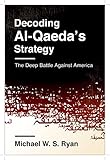Decoding Al-Qaeda's Strategy : The Deep Battle Against America / Michael Ryan.
Material type: TextSeries: Columbia Studies in Terrorism and Irregular WarfarePublisher: New York, NY : Columbia University Press, [2013]Copyright date: ©2013Description: 1 online resource (368 p.) : ‹B›Figures: ‹/B›3Content type:
TextSeries: Columbia Studies in Terrorism and Irregular WarfarePublisher: New York, NY : Columbia University Press, [2013]Copyright date: ©2013Description: 1 online resource (368 p.) : ‹B›Figures: ‹/B›3Content type: - 9780231163842
- 9780231533270
- 363.325 22
- HV6432.5.Q2 R93 2013
- HV6432.5.Q2 R93 2013
- online - DeGruyter
- Issued also in print.
| Item type | Current library | Call number | URL | Status | Notes | Barcode | |
|---|---|---|---|---|---|---|---|
 eBook
eBook
|
Biblioteca "Angelicum" Pont. Univ. S.Tommaso d'Aquino Nuvola online | online - DeGruyter (Browse shelf(Opens below)) | Online access | Not for loan (Accesso limitato) | Accesso per gli utenti autorizzati / Access for authorized users | (dgr)9780231533270 |
Frontmatter -- Contents -- Note on Transliteration -- Acknowledgments -- Introduction -- 1. The Historical Roots of Al-Qaeda's Ideology -- 2. The Leadership Inspires a New Strategy -- 3. Jihad as Revolution -- 4. An Action Plan for Savagery -- 5. The Jihadist Legacy of Abu Mus'ab al-Suri -- Conclusion: What It All Means -- Appendix 1: Translation of "Revolutionary Wars" -- Appendix 2: Translation of "Fourth-Generation Warfare" -- Notes -- Bibliography -- Index
restricted access online access with authorization star
http://purl.org/coar/access_right/c_16ec
By consulting the work of well-known and obscure al-Qaeda theoreticians, Michael W. S. Ryan finds jihadist terrorism strategy has more in common with the principles of Maoist guerrilla warfare than mainstream Islam. Encouraging strategists and researchers to devote greater attention to jihadi ideas rather than jihadist military operations, Ryan builds an effective framework for analyzing al-Qaeda's plans against America and constructs a compelling counternarrative to the West's supposed "war on Islam."Ryan examines the Salafist roots of al-Qaeda ideology and the contributions of its most famous founders, Osama Bin Laden and Ayman al-Zawahiri, in a political-military context. He also reads the Arabic-language works of lesser known theoreticians who have played an instrumental role in framing al-Qaeda's so-called war of the oppressed. These authors readily cite the guerrilla strategies of Mao, Che Guevara, and the mastermind of the Vietnam War, General Giap. They also incorporate the arguments of American theorists writing on "fourth-generation warfare." Through these texts, readers experience events as insiders see them, and by concentrating on the activities and pronouncements of al-Qaeda's thought leaders, especially in Yemen, they discern the direct link between al-Qaeda's tactics and trends in anti-U.S. terrorism. Ryan shows al-Qaeda's political-military strategy to be a revolutionary and largely secular departure from the classic Muslim conception of jihad, adding invaluable dimensions to the operational, psychological, and informational strategies already deployed by America's military in the region.
Issued also in print.
Mode of access: Internet via World Wide Web.
In English.
Description based on online resource; title from PDF title page (publisher's Web site, viewed 02. Mrz 2022)


